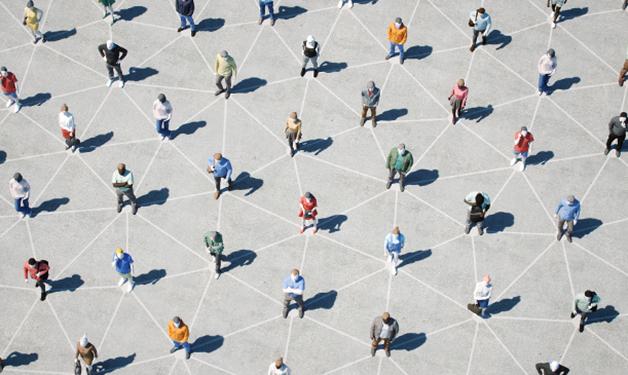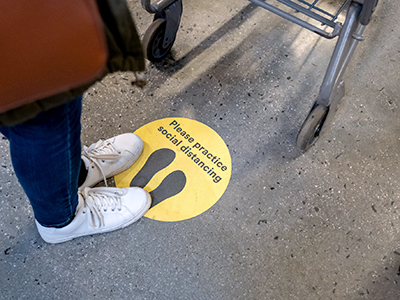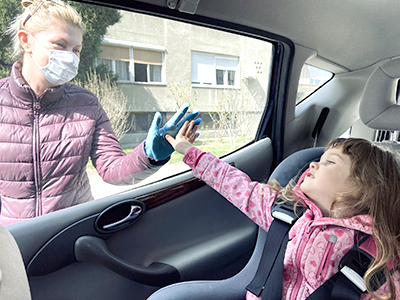
Our expert explains the science behind how the new normal impacts our lives.
Since the beginning of the COVID-19 outbreak, one of the most talked about health recommendations to prevent the spread of the virus has been physical distancing, which means to stay at least two metres apart from others. As we adjust to this new normal, Dr. Emma Morton shares why we may be feeling strange about keeping our distance, along with strategies to help us cope.
Q: Why do I feel less motivated and more stressed during these times of physical distancing?
A: When we experience acute stress, even for a short period of time, our body goes into a fight or flight state, which prepares us for getting away from danger. We can get tense muscles and an elevated heart rate, and can feel very hypervigilant. Once that stress is resolved, our body returns to a more relaxed state.

When left untreated, prolonged stress can impact body functions and increase our risk of developing some diseases, such as cardiovascular disease, obesity, digestive issues and diabetes. This is why it is important to talk to a health care professional, such as your family doctor, if you are feeling overly stressed.
Q: Could not having close contact with others be affecting my sleep?
A: Social contact supports good sleep because it is often a part of our normal routine and links up with the day-night cycle in the natural environment. We often do certain activities at certain times on a regular basis, such as going to work, going for an afternoon coffee, playing a sport or having dinner with friends and family. These routines, along with sun exposure, support the normal function of our internal clock, or circadian rhythms, by telling us when we should be awake or asleep.
Getting into a regular routine that includes exercise and sun exposure during the day, and avoiding things that can impair sleep, such as alcohol, can help improve the quality of our sleep.
Q: Are introverted and extroverted people impacted differently?
A: People who are extroverted tend to get their psychological energy replenished through social encounters. They are more likely to choose leisure activities that are social, such as board game nights or group sports. Their sense of belonging and purpose can also be tied up in social activities, such as volunteering and being a good friend. This can make it more challenging for extroverts to adapt to not having as much social contact.

However, people who are more introverted are still being impacted by less social contact, and may even feel looked over because others assume they are doing fine. Introverts may still need to recharge by doing solo activities, such as getting out in nature or going to the gym, which may be more difficult to access right now.
“You do not have to come out of the pandemic having learned another language or built a bookshelf. Sometimes the most important thing is to find stability in our life during a difficult time.”
Q: Can I trick my brain into thinking that nothing’s wrong?
A: It is understandable to want to pretend that nothing is wrong. The unfortunate reality is that our minds are like worrying machines in the face of uncertainties or threats. In fact, a lot of cognitive behavioural approaches to anxiety suggest that trying to switch off worrying thoughts tends to make them worse. It becomes a game of whack-a-mole as we try to push down every worrying thought that pops up.
Worry and anxiety are normal feelings. In fact, anxiety is an important emotional cue that tells us that there is danger in the environment. It is an adaptive reminder to do things that help keep us safe. For example, during the COVID-19 pandemic, anxiety can help remind us to wash our hands regularly, stay home when possible and take appropriate preventative measures when out in public. When worrying starts to take over or become unmanageable, practicing coping strategies can help us get a handle on our anxious thoughts.
Q: What are some ways to cope with worry and stress during a pandemic?
A: One main coping strategy is to write a list of things you have control over and can act on. Create a game plan with steps you will take to address those worries and a timeline for putting those steps into action. Then identify things over which you have no control and recognize that worrying about them further will not improve your situation. Some people find it helpful to set a specific time for worrying, for example four o’clock in the afternoon. When that time rolls around, many find that they no longer need to engage with that worry and it no longer takes over their day.
The number one thing that I recommend is to practice self-compassion. Be mindful of your thoughts and experiences. Once you are aware of your feelings, you can make a deliberate choice to respond to them with kindness, such as offering yourself understanding and doing things to self-sooth.



